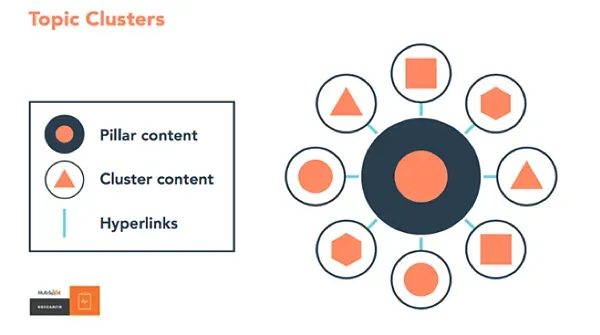Keyword Research vs Topic Clustering for SEO
In the realm of SEO, two strategies often come to the forefront.
Keyword research and topic clustering.
Both play crucial roles in boosting your website's visibility. But how do they differ? And when should you use each one?
This article delves into the nuances of keyword research and topic clustering for SEO. We'll explore their benefits, methodologies, and the tools that can aid in their implementation.
Whether you're an SEO professional or a content marketer, this comparative analysis will provide valuable insights.
Stay tuned to learn how to leverage these strategies for your content marketing efforts.
Photo By: Dashthis
Understanding Keyword Research
Keyword research is a fundamental SEO practice. It involves identifying the terms and phrases your target audience uses when searching online.
This process helps you understand what topics your audience is interested in. It also reveals the language they use, which is crucial for content creation.
The Role of Keyword Research in SEO
Keyword research is the backbone of SEO. It guides your content strategy, helping you create relevant, searchable content.
Moreover, it aids in understanding
SEO keyword competition analysis. This knowledge allows you to target less competitive, yet valuable keywords.
How to Perform Keyword Research: A Checklist
Performing keyword research can seem daunting. However, with a systematic approach, it becomes manageable. Start by defining your goals. What do you want to achieve with your content? Next, identify your target audience. Who are they, and what are they searching for?
Then, use keyword research tools to find relevant keywords. Look for terms with high search volume and low competition. Additionally, understanding how to make a list of SEO keywords will further streamline this process.
Finally, analyze the competition. What keywords are your competitors ranking for? By following this checklist, you can conduct effective keyword research.
Exploring Topic Clustering
Topic clustering is another SEO strategy gaining traction. It involves grouping related content together to form 'clusters'.
This approach helps search engines understand the depth and breadth of your content. It also improves site structure, making it easier for users to navigate.
The Benefits of Topic Clustering for SEO
Topic clustering enhances your site's relevance and authority. By covering a topic thoroughly, you demonstrate expertise to search engines.
Moreover, it aligns with Google's focus on search intent. By
clustering related content, you cater to various user queries within a single topic.
Creating Content Clusters: A Step-by-Step Guide
Creating content clusters involves a systematic process. Here's a step-by-step guide to help you.
First, identify a broad topic relevant to your audience. This becomes your 'pillar' content. Next, create 'cluster' content. These are pieces related to the pillar topic, but focus on specific aspects. When developing this content, remember that content optimization is key to ensuring that each piece resonates with your audience and performs well in search engines.
Then, link the cluster content to the
pillar content. This creates a network of related content, improving site structure. Finally, optimize each piece of content for SEO. Use relevant keywords, meta tags, and ensure high-quality content. This enhances the visibility of your content clusters.
Keyword Research vs Topic Clustering: A Comparative Analysis
Keyword research and topic clustering are both vital for SEO. However, they serve different purposes and are used in different contexts.
While keyword research helps identify specific terms users search for, topic clustering organizes content around broad themes. Both strategies aim to improve visibility and relevance in search engine results.
When to Use Keyword Research
Keyword research and targeting is crucial when you're starting a new website or launching a new product. It helps identify the terms your target audience uses when searching for your product or service.
Moreover, it's also essential when
optimizing PPC campaigns. By identifying high-performing keywords, you can improve your ad relevance and performance.
When to Opt for Topic Clustering
Topic clustering is beneficial when you have a large amount of content on your site. It helps organize this content, making it easier for users and search engines to navigate.
Additionally, it's a great strategy when you're aiming to
establish authority on a particular topic. By creating comprehensive content clusters, you demonstrate your expertise to search engines.
Tools and Services for Keyword and Topic Strategies
To effectively implement keyword research and topic clustering, you need the right tools and services. These can help you identify relevant keywords, understand competition, and organize your content effectively.
Moreover, they can provide valuable insights into search trends and user behavior, helping you refine your SEO strategy.
Best Practices for Using Keyword Clustering Tools
When using keyword clustering tools, it's important to start with a broad list of keywords. This allows the tool to identify relevant clusters and variations.
Additionally, regularly updating your keyword list can help you stay on top of changing search trends and maintain your site's relevance.
Photo By: Content Marketing Institute
Measuring the Success of Your SEO Strategy
Once you've implemented your keyword research and topic clustering strategies, it's crucial to measure their success. This helps you understand what's working and what needs improvement.
You can use various metrics to evaluate your SEO strategy, including
organic traffic,
keyword rankings, and
user engagement.
Key Metrics for Keyword Research
For keyword research, important metrics include keyword rankings and organic search traffic. These indicate how well your chosen keywords are performing in search results.
Additionally, the conversion rate can show if your keywords are attracting the right audience and leading to desired actions.
Evaluating the Impact of Topic Clustering
When it comes to topic clustering, look at metrics like page views and time spent on page. These can indicate if your content clusters are engaging users and keeping them on your site.
Also, consider the bounce rate. A lower bounce rate suggests that your content is relevant and satisfying user queries.
Conclusion
At Quantifi Media, we understand that in the ever-evolving landscape of SEO, both keyword research and topic clustering play pivotal roles in elevating your digital presence. Choosing between these strategies hinges on your specific goals and the nature of your content. By fully grasping their unique benefits and implementing them effectively, you can significantly enhance your content strategy and boost your visibility in search engine results.
Whether you’re interested in robust keyword research services or looking to develop a comprehensive topic clustering approach for SEO, our team is here to assist you. For tailored insights and strategies that cater to your unique business needs, don’t hesitate to
contact us today!
Share this blog!






